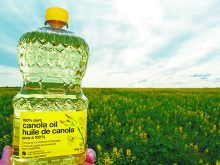WINNIPEG – America’s soybean industry has fired a loud warning shot at seed oil skeptics.
On Tuesday, the American Soybean Association said that a ban on seed oils in the U.S. food supply would inflict billions in economic damage to farmers and force American consumers to spend an additional USD$7.7 billion annually on replacement products like palm oil, olive oil and animal fat.
The data comes from a study commissioned by the United Soybean Board, which hired the World Agricultural Economic and Environmental Services, a consultancy, to evaluate the impacts of a U.S. ban on seed oils like soybean, canola, corn, sunflower and cottonseed oil.
Read Also

Farmland advisory committee created in Saskatchewan
The Saskatchewan government has created the Farm Land Ownership Advisory Committee to address farmer concerns and gain feedback about the issues.
The ban would force the U.S. to import large volumes of palm and olive oil, thus driving up the price of palm oil, the study found.
“Since significant quantities of olive and palm oil are not produced domestically, the US becomes more reliant on imports of vegetable oils,” the report says.
“Under the flat veg oil consumption scenario, the shift in US food consumption to palm oil results in higher palm oil prices with palm selling at a 78 per cent average premium to soybean oil prices over the 2025/26-2035/36 period.”
Plus, Americans consume about 58 lbs of soybean, canola and corn oil annually, per capita. Replacing that with other oils and fats would be complicated and costly, the report noted.
“A 58-pound per-capita loss of seed oil would be filled primarily by increased palm oil consumption (53 pounds), which would have to be imported,” the report says. “The Consumer Price Index (CPI) for fats and oils would, in turn, increase by 28.7 per cent. Consumer expenditures on vegetable oils and fats would increase by USD$7.7 billion per year on average—a 43 per cent increase.”
The American Soybean Association, which advocates for growers on policy and trade, is promoting this study because the U.S. Secretary of Health – Robert F. Kennedy Jr. – is a vocal critic of seed oils like soybean and canola oil.
He claims the oils are associated with a list serious illnesses including body-wide inflammation.
“Seed oils are one of the most unhealthy ingredients that we have in foods and the reason they’re in the foods is that they’re heavily subsidized,” he said in an October 2024 interview on Fox & Friends.
Kennedy’s campaign against seed oils is part of a larger movement of online influencers and C-List celebrities who firmly believe that animal fat is healthier than seed oils.
Some restaurant chains have responded by removing sunflower or canola oil from their deep fryers and replacing it with beef tallow.
The American Soybean Association, which represents about 500,000 soybean growers from 30 states, has been pushing back on Kennedy and his theories about seed oils.
The U.S. Food and Drug Administration has found supportive evidence that soybean oil and foods made with soybean oil can lower bad LDL cholesterol and reduce the risk of coronary heart disease, said Caleb Ragland, ASA President and a soybean grower from Kentucky.
“Why would we rock that boat without any scientific reason if soy oil has, time and again, been found safe and even to have potential health benefits,” he said in a press release. “That does not make logical sense and does not seem worth taking away consumer choice and killing nearly half (43 per cent) of our domestic soy oil market.”
A potential ban on seed oils would devastate prices for soybean oil and canola oil in America, says the World Agricultural Economic and Environmental Services report.
The authors of the report said it’s difficult to analyze a ban on seed oils, because imported palm oil cannot replace canola or soybean oil in foods like salad dressing. Plus, there are allergen issues with peanut oil and beef fat has limited uses in food formulations.
Nonetheless, the report estimates that soybean and canola prices would both decline over the next decade.
Again, it’s very difficult to calculate all the permutations of a seed oil ban in America, but it’s likely that a seed oil ban would inflict greater pain on canola growers, the report says.
“The larger impact on canola prices is due to canola oil being a larger share of the content of the canola seed (44 per cent) versus soybean oil’s share of the soybean seed (19 per cent),” says the report. “Loss of U.S. food demand results in a larger impact on the canola crush margin and subsequently more impact on canola prices than soybean prices.”
Contact robert.arnason@producer.com
















